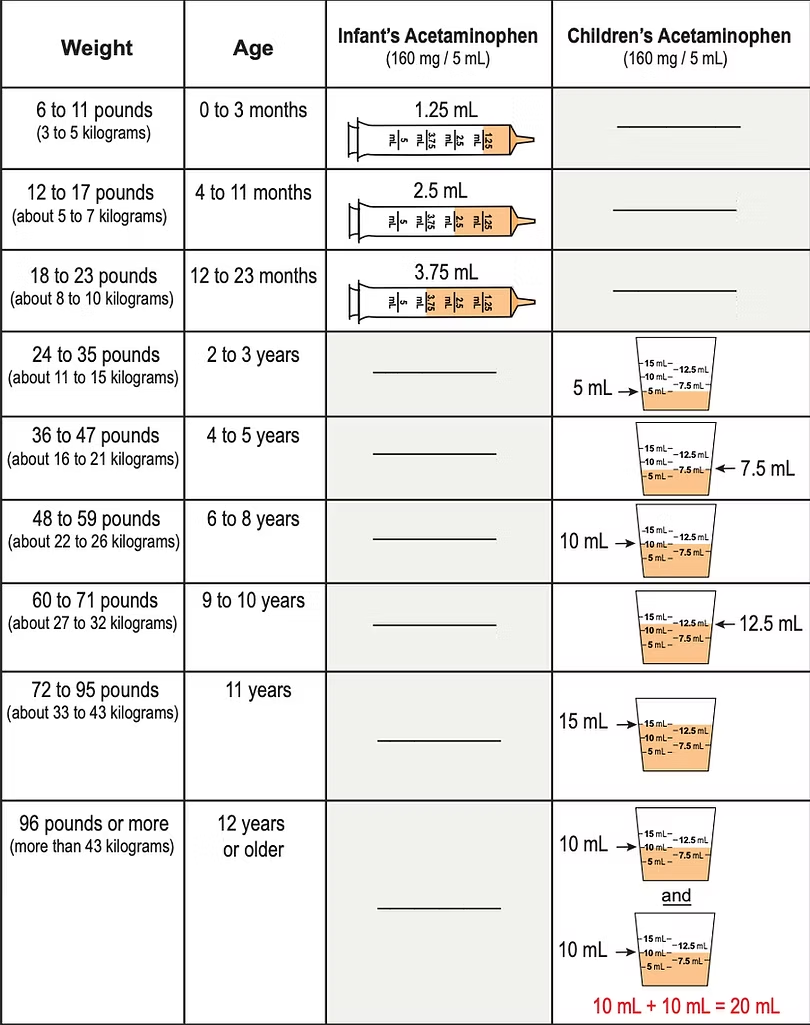When your baby has a fever, it’s natural to worry. Many parents turn to liquid acetaminophen to help reduce fever and provide relief from minor aches and pains. However, knowing the correct infant Tylenol dosing is crucial to ensure safety and effectiveness. In this guide, we will explain everything about proper dosing, common mistakes to avoid, and how ibuprofen dose for infants compares to acetaminophen.
Understanding Infant Tylenol Dosing: Why Proper Measurement Matters
Giving the right dose of acetaminophen is essential because an incorrect amount can either be ineffective or lead to accidental overdose. Acetaminophen is a widely used fever reducer, but it must be administered according to the baby’s weight rather than age for best results.
Recommended Infant Tylenol Dosage Chart Based on Weight
- 6–11 lbs (2.7–5 kg): 1.25 mL of 160 mg/5 mL liquid
- 12–17 lbs (5.5–7.7 kg): 2.5 mL
- 18–23 lbs (8.2–10.4 kg): 3.75 mL
- 24–35 lbs (10.9–15.9 kg): 5 mL
This dosage can typically be repeated every 4 to 6 hours, but never more than five doses in 24 hours.
How Infant Tylenol Dosing Differs from Ibuprofen Dose for Infants
Parents often wonder whether acetaminophen or ibuprofen is better for fever relief. Both are effective, but they work differently:
- Acetaminophen (Tylenol): Safe for infants as young as 2 months. It helps reduce fever and minor pain but does not reduce inflammation.
- Ibuprofen (Motrin, Advil): Safe for infants over 6 months old. It relieves fever, pain, and inflammation but should always be given with food to avoid stomach upset.
Ibuprofen Dosage Guide Based on Weight
- 12–17 lbs (5.5–7.7 kg): 1.25 mL of 50 mg/1.25 mL liquid
- 18–23 lbs (8.2–10.4 kg): 1.875 mL
- 24–35 lbs (10.9–15.9 kg): 2.5 mL
Ibuprofen is usually given every 6 to 8 hours and should not exceed four doses in 24 hours.
Common Mistakes Parents Make When Administering Infant Tylenol
Even with the best intentions, parents can sometimes make mistakes when giving medication. Here are some of the most common errors:
- Using a kitchen spoon instead of the provided syringe or dropper – Always use the measuring tool that comes with the medication.
- Guessing the dose instead of following weight-based guidelines – Follow the dosing chart carefully to avoid underdosing or overdosing.
- Mixing medications without consulting a doctor – If giving ibuprofen and acetaminophen together, seek medical advice to ensure proper spacing between doses.
- Giving medication too frequently – Stick to the recommended time intervals to prevent toxicity.
Conclusion: Ensuring Safe Infant Tylenol Dosing for Effective Fever Management
When your infant has a fever, proper dosing of acetaminophen can provide safe and effective relief. Always measure the medication carefully, follow weight-based dosing charts, and avoid common mistakes. If you are considering ibuprofen dose for infants, ensure your baby is at least 6 months old before administering it. When in doubt, consult a pediatrician for guidance on the best approach to fever management.
By understanding the correct infant Tylenol dosing, parents can confidently care for their little ones while ensuring their safety and comfort.









